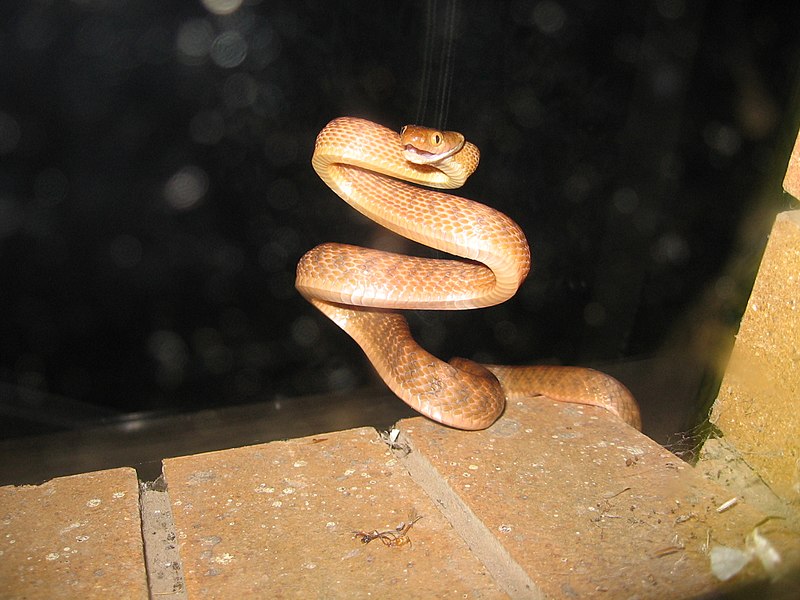Spring is in the air in the Northern Hemisphere, and snake keepers are busy preparing for another breeding season. Species that range into temperate regions are especially likely to be stimulated to reproduce as the seasons change. For those interested in boas, I highly recommend working with North America’s beautiful Rosy Boa (Lichanura trivirgata). Small, hardy and live-bearing, this gem among constrictors is a great choice for both first- time and advanced breeders. Read More »
Category Archives: Snakes
Feed SubscriptionRattlesnakes – an Overview of the Most Highly Evolved Serpents
The subjects of today’s article, while not suitable pets under any circumstances, still hold great interest for reptile enthusiasts. Today we’ll take a look at some of their unique characteristics.
Rattlesnake Central
Growing up in NYC, I had the distinct pleasure of easy access to the Staten Island Zoo’s Reptile House, which was lorded over by the man known worldwide for introducing a generation of aspiring herpetologists to snake keeping – Carl Kauffeld. At the time, the zoo boasted a collection containing every known Rattlesnake species. Several years ago, I was thrilled to be chosen as consultant on the Reptile House renovation, and today Rattlesnakes again take center stage there (please see photo below). Read More »
Snake Escapes – Recovering Cobras and other Snakes in Zoos and Homes – Part 2
 Please see Part I of this article for some cobra and python escape stories set in NYC.
Please see Part I of this article for some cobra and python escape stories set in NYC.
The “Ditmar’s Trap”
I first became aware of snake traps through The Reptiles of North America, written by legendary Bronx Zoo curator Raymond Ditmars. Mr. Ditmars recounted capturing Northern Watersnakes (Nerodia sipedon) by securing fish to strings that were anchored to stumps in likely locations…a feat I was later to repeat successfully on several occasions (snakes have trouble backing off prey once it has been swallowed, and Watersnakes are especially ravenous feeders). If you have collected Watersnakes by hand, you’ll understand the attraction of a method that spares one’s skin! Read More »
Cold Snap in Florida Affects Introduced (i.e. Burmese Pythons) and Native Herps
 I’ve received a number of questions lately from herp enthusiasts (and “regular people”!) who have come across cold-stunned reptiles and amphibians in Florida. Cuban Knight Anoles, Green Tree Frogs and many other species have been severely impacted by the record-breaking cold weather.
I’ve received a number of questions lately from herp enthusiasts (and “regular people”!) who have come across cold-stunned reptiles and amphibians in Florida. Cuban Knight Anoles, Green Tree Frogs and many other species have been severely impacted by the record-breaking cold weather.
Burmese Pythons
A colleague’s comment on cold weather and Florida’s introduced Burmese Pythons brought to mind an incident that occurred several years ago. A friend of mine stopped into a coffee shop near Florida City and was surprised to see the skins of 14 large Burmese Pythons tacked to the wall. She learned that the shop’s owner had captured all along one road on a single warm morning following a cold snap. Herpetologists also know that such times are ideal for collecting, as snakes flock to roads to take advantage of the warm pavement and access to sun. Read More »
Snake Escapes – Recovering Cobras and other Snakes in Zoos and Homes – Part 1
 Snakes have a well-deserved reputation as escape artists and, once at liberty, they are nearly impossible to find. Almost always, the escapee shows up by accident, no matter how hard one searches – even quite large snakes can virtually disappear in relatively small areas (please see photo – the 16 foot long anaconda pictured there “vanished” in about 6 inches of water on the Venezuelan llanos; I took over an hour to find her despite “knowing” where she was!). However, there are a few tricks that can improve your chances of recapturing a lost pet…but first, if I may, a few related stories:
Snakes have a well-deserved reputation as escape artists and, once at liberty, they are nearly impossible to find. Almost always, the escapee shows up by accident, no matter how hard one searches – even quite large snakes can virtually disappear in relatively small areas (please see photo – the 16 foot long anaconda pictured there “vanished” in about 6 inches of water on the Venezuelan llanos; I took over an hour to find her despite “knowing” where she was!). However, there are a few tricks that can improve your chances of recapturing a lost pet…but first, if I may, a few related stories:
Cobras “Helped” out of Their Exhibit
My most dramatic snake escape/recapture began not due to carelessness but rather via a deliberate act of vandalism. Amazingly, a visitor to the Bronx Zoo’s Reptile House (where I worked as an animal keeper) lifted his son up so that the boy could kick in the glass of the Spitting Cobra Exhibit! This insanity took place on a crowded summer afternoon…when all such incidents seem to occur. Read More »
 That Reptile Blog – Reptile, Amphibian and Exotic Pet Care and Information
That Reptile Blog – Reptile, Amphibian and Exotic Pet Care and Information
